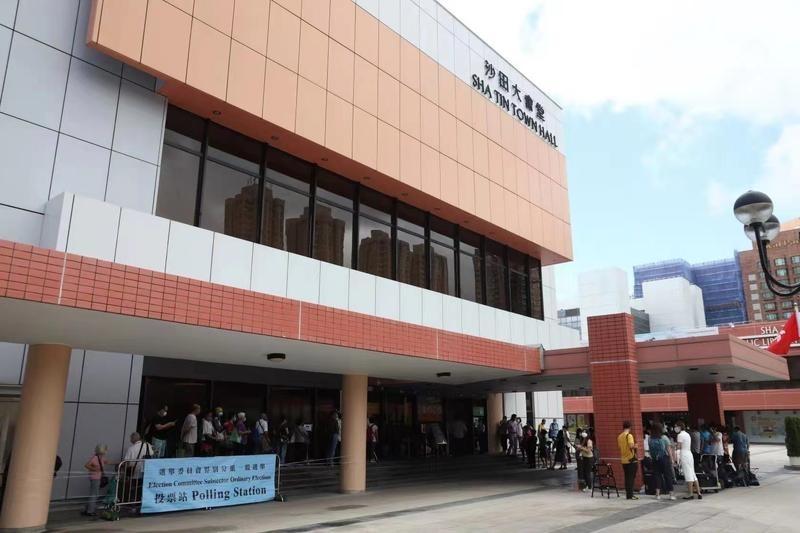Editor’s note: This is Part 4 of a series on the Hong Kong Special Administrative Region’s new elections.
 Voters line up outside a polling station for the 2021 Election Committee Subsector Ordinary Elections at the Sha Tin Town Hall on Sept 19, 2021. (CALVIN NG / CHINA DAILY)
Voters line up outside a polling station for the 2021 Election Committee Subsector Ordinary Elections at the Sha Tin Town Hall on Sept 19, 2021. (CALVIN NG / CHINA DAILY)
The 2021 Election Committee elections on Sunday were spared the usual curse of dirty politics by anti-China forces or extreme agendas designed to split Hong Kong society. Instead, only pragmatic, rational and professional policy platforms, focused on healthy socioeconomic development, were competing for electorate support. Inarguably, the improved electoral system has transformed Hong Kong’s political landscape, changed its election and political culture, and is facilitating a milestone shift from instability to stability in terms of social order and constitutional development.
The improved electoral system has shown positive results as Sunday’s Election Committee elections proceeded without disruption by anti-China groups like they did in previous polls.
Stability has been a most popular demand, and heard loud and clear in the run-up to Sunday’s polls for the revamped Election Committee. This is because all the elections in recent years were adversely affected by attempts to trigger political chaos one way or another — with divisive agendas. Since Hong Kong returned to China in 1997, local proxies of anti-China Western forces have done everything they could to disrupt and obstruct the HKSAR’s constitutional development by hoodwinking the public into supporting their subversive agendas in the name of “democracy” during election campaigns. Such destabilizing and divisive campaigns, particularly those initiated in recent years, were designed to help forces opposed to China or the Communist Party of China grab governing power in Hong Kong and, ultimately, turn the region into a base for a “color revolution” against the central authorities, which will play into the hands of hostile external forces with a strategy to contain China. As a result, Hong Kong society was forced to live with turmoil frequently for more than 20 years. Statistics show that, in the years up to early 2020, when the COVID-19 pandemic forced the city into a partial lockdown, Hong Kong had topped the world in terms of registering the highest number of protest rallies, gaining notoriety as the “protest capital of the world”. So much so, Hong Kong was turned from a dynamic city and trading hub into a political hotbed and disrupted city.
ALSO READ: Electoral system broadens city's representation
The “black revolution” of 2019, which began with the anti-extradition-bill agenda as an excuse and soon turned violent, led to a surge in confrontational politics. The district council elections held late that year were used by the anti-China forces as one of their battlefields. Pro-establishment or patriotic candidates were subject to various threats and even physical violence by followers of the anti-China forces riding the waves of “black terror” sweeping through the city at that time. Gone were fair and just elections, which were replaced by an all-out campaign to seize the power to govern Hong Kong by taking control of the district councils, the Legislative Council and the office of the chief executive.
The facts have shown time and again that anti-China forces went all out to sabotage democratic elections under the guise of “democracy” by exploiting the loopholes in Hong Kong’s electoral system. Thus, the original purpose of holding elections to put qualified and competent individuals in public office was repeatedly compromised as subversives and separatists working in collusion with external anti-China forces won seats in the city’s legislature or the district councils, and acted as Trojan horses inside the SAR’s governance establishment. They posed unprecedented challenges to the implementation of “one country, two systems” under the Basic Law of the HKSAR, while inflicting tremendous damage on the overall interest of Hong Kong residents.
The biggest loophole in the old electoral system allowed the local proxies of anti-China forces to infiltrate Hong Kong’s governance structure and cause havoc by abusing public power once they won elections with untoward means. Thankfully, the central authorities took decisive measures to end the persistent subversive campaign with the National Security Law for Hong Kong and improvement of the city’s electoral system, helping the SAR restore order and effective rule of law, so that it can focus on containing the pandemic and reviving the economy, as well as social and political stability. The improved electoral system has shown positive results as Sunday’s Election Committee elections proceeded without disruption by anti-China groups like they did in previous polls. Undoubtedly, the central authorities’ decisions have changed Hong Kong’s election culture and political ecosystem for the better and for good.
READ MORE: Political reality made revamp of election system necessary
Without a stable political system and harmonious social environment, the SAR government cannot concentrate on economic development and people’s livelihoods as much as necessary. Political stability comes first for obvious reasons, hence the National People’s Congress Standing Committee’s move to improve Hong Kong’s electoral system through local legislation in accordance with amendments to Annex I and Annex II of the Basic Law of the SAR. It’s the only way to ensure “patriots administering Hong Kong”, good governance under the rule of law, social and political stability, and long-term prosperity in Hong Kong.
The author is a current affairs commentator.
The views do not necessarily reflect those of China Daily.


